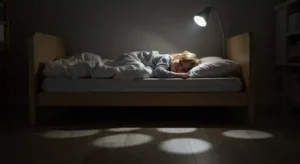Analyze a study exploring links between sleep duration and health. Learn why health experts explain why being “paranoid” about long sleep duration might be risky, but healthy sleep is still vital & not harmful. Source links included.
British Study: Can Too Much Sleep Really Kill You?
British media made waves in 2014 with headlines warning about the dangers of long sleep, asking: “Can too much sleep kill you?”
That might sound counterintuitive — how could sleep, something essential for good health, be harmful?
A major study out of the UK reignited this debate by suggesting that long sleep duration might be linked to a higher risk of stroke. But before jumping to conclusions, let’s look at what the data actually says — and what it doesn’t.
What the Study Found
Researchers followed nearly 10,000 adults for several years to explore how sleep habits might correlate with health outcomes.Important caveat: The study could not prove causation — only correlation. Long sleep may not cause stroke but could reflect underlying conditions, such as inflammation, cardiovascular issues, or obstructive sleep apnea (OSA).
Sleep Duration Breakdown:
- 69% were average sleepers (6–8 hours per night)
- 21% slept less than 6 hours
- 10% consistently slept more than 8 hour
Over nearly a decade, 346 participants experienced a stroke. The study revealed that:
- Long sleepers (over 8 hours) had a significantly higher risk of stroke
- People whose sleep duration increased over time were twice as likely to have a stroke
Important caveat: The study could not prove causation — only correlation. Long sleep may not cause stroke but could reflect underlying conditions, such as inflammation, cardiovascular issues, or obstructive sleep apnea (OSA).
Understanding the Context: What Long Sleep Might Really Mean
Long sleep is not inherently dangerous, but it can signal something else:
- Health Red Flag: Excessive sleep can be a symptom of poor health — not necessarily the cause.
- Sleep Disorders: Conditions like OSA often cause excessive tiredness, leading people to sleep longer while still feeling unrested.
- Talk to Your Doctor: If you’ve recently started sleeping more than usual and still feel tired, that’s worth discussing with a healthcare provider.
Healthy Sleep is Still Essential
Despite the headlines, this study reinforces — not contradicts — the importance of healthy, adequate sleep.
Key Takeaways:
- Aim for 7–9 hours per night — this remains the gold standard for most adults.
- Short sleep (under 6 hours) has clear risks: increased heart disease, cognitive decline, weakened immunity
- Long sleep may be a sign of something else, but isn’t dangerous on its own
Conclusion
So… can too much sleep kill you?
Not directly. But changes in your sleep patterns, especially excessive sleep paired with fatigue, could be signs worth investigating — not ignoring.
Gentle, consistent sleep remains one of the best things you can do for your health. And if you’re ever in doubt, talk to a sleep specialist. Your well-being may depend on it — but not because you’re “sleeping too much.”
Frequently Asked Questions
Can sleeping too much really be harmful?
While enough good sleep is essential, consistently sleeping more than 9 hours might sometimes indicate an underlying health issue like heart problems, including stroke. But aiming for 7-8 hours usually fits most adults. Feeling tired persists a sign, not necessarily needing nights of 10+ hours.
Should I be worried if I naturally sleep 8-9 hours most nights?
For many people, sleeping 8-9 hours is perfectly healthy if they feel refreshed. Studies look at extremes, but 7-9 hours often falls within the healthy range recommended for adults. Prioritize restful sleep over arbitrary sleep time length. Discuss prolonged sleep with your doctor if it worries you.
Sources
- Sleep Apnea and Stroke Risk: https://www.mayoclinic.org/diseases-conditions/sleep-apnea/symptoms-causes/syc-20351556
- Healthy Sleep Guidelines: https://www.cdc.gov/sleep/campaigns/refresh/about-refresh/index.html
- Long Sleep Duration Health Risks: https://www.healthline.com/health/sleep/long-sleep








